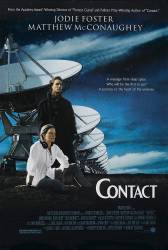Plot hole: During the Congressional hearing, it is suggested that the alien signal could have been faked from a satellite - as Ellie only has her own experience to go on, it leaves her believing what happened, but still with an element of doubt. However, as a professional astronomer, Ellie would have immediately dismissed this since a simple parallax (triangulation) would have confirmed that source was at the distance of Vega - a distance far too great for any rocket to reach. (This is mentioned in the book). In fact, this is mentioned early in the film, when the employees in New Mexico calculate the source of the signal while it is transmitting prime numbers.
Plot hole: After Ellie makes her journey which she firmly believes happened she is questioned as everyone else watched the pod drop straight down into the water. But no mention is made of the chair that is violently shaken loose during her 18 hour journey. If that were to have happened in the split-second the pod fell through she would have been badly injured more than just a bump on the head.






Chosen answer: Ellie defended her version of the facts with everything she had to work with, but the simple fact was that the government cover-up was just too strong for her to overcome. The points you raise are perfectly reasonable, but the version of events released by the powers-that-be denies everything that happened and, without any other proof, Ellie has only her word to convince people with. For some, that's enough, as we see in the film, even if a majority choose to believe the "official" version.
Tailkinker ★